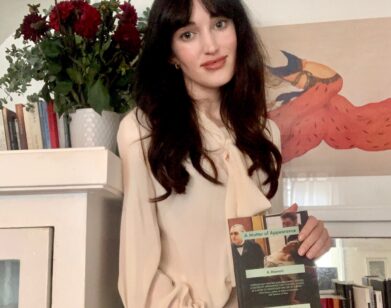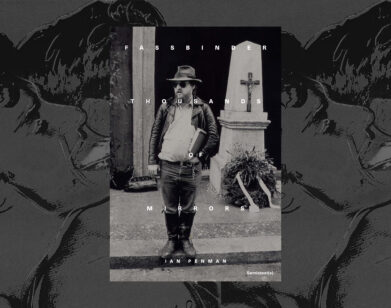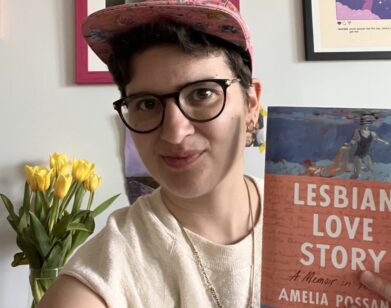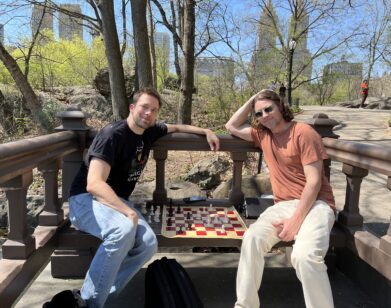Hilary Leichter Wrote the Origin Myth of the Gig Economy
 Hilary Leichter is over the moon. Her debut novel Temporary has garnered critical acclaim in all the right places—and it’s well-deserved. In the book, our nameless protagonist is a young woman who bounces between different temp assignments. Sometimes she’s a human barnacle, enlisted to replace those sea creatures who have gone extinct, at other times, she works on a pirate ship. Even her love life is predicated on short bursts of interaction; she juggles eighteen boyfriends, none of whom live with her. Aimless as she might seem, there’s a deep ambition buried in her heart. She is constantly searching and yearning for something steady, dependable, passionate, embodying—that thing that every girl dreams of: a stable job. Leichter succeeds in creating a space for wonder and tenderness in an anxiety-inducing job market. Her unorthodox narrative and whimsical writing push you across the page. Reading Temporary is like discovering the origin myth of the gig economy. Amidst a current plunging eeconomy, we asked Leichter about her history of colorful jobs, and the emerging canon of literature around work.
Hilary Leichter is over the moon. Her debut novel Temporary has garnered critical acclaim in all the right places—and it’s well-deserved. In the book, our nameless protagonist is a young woman who bounces between different temp assignments. Sometimes she’s a human barnacle, enlisted to replace those sea creatures who have gone extinct, at other times, she works on a pirate ship. Even her love life is predicated on short bursts of interaction; she juggles eighteen boyfriends, none of whom live with her. Aimless as she might seem, there’s a deep ambition buried in her heart. She is constantly searching and yearning for something steady, dependable, passionate, embodying—that thing that every girl dreams of: a stable job. Leichter succeeds in creating a space for wonder and tenderness in an anxiety-inducing job market. Her unorthodox narrative and whimsical writing push you across the page. Reading Temporary is like discovering the origin myth of the gig economy. Amidst a current plunging eeconomy, we asked Leichter about her history of colorful jobs, and the emerging canon of literature around work.
–––
SHANTI ESCALANTE: You’ve been receiving such positive praise for your debut novel. How does it feel to be getting this kind of feedback?
HILARY LEICHTER: It feels like I’m being granted wishes that I never knew I could ask for. I was hoping that one person would read it and say, “This reminds me of my life.” That was my big dream for this book. So to have such amazing feedback, it’s been a joy.
ESCALANTE: Have you worked a lot of temp jobs in the past?
LEICHTER: I have only worked a few temp jobs that were through actual temp agencies. Most of my jobs are sort of these, “a person knows a person” things—there’s a person who needs some scanning or photocopying done. And they’re kind of these tasks, these gigs, which I consider to be part of the temp economy, even if they’re not through an agency. But the actual temp jobs that I’ve had are working for a property management company. I did some work at several different financial services companies, and a lot of the big companies in New York have in-house temp workers that I knew until I started working for them. A lot of my jobs on my resume that look like they’re not temp jobs actually are. Is that a way to not have to pay insurance for your employee?
ESCALANTE: Did you draw from your friends’ experiences as well?
LEICHTER: I didn’t do much research for the book, but something that’s been really fun in the aftermath of writing it has been hearing everyone’s crazy job experiences. You know when you tell people that you’re writing a book like this or that you’ve written a book like this one, everyone wants to tell you about their weirdest job.
ESCALANTE: What’s the strangest job you’ve heard of so far?
LEICHTER: One of the strangest that I can remember is my aunt telling me about working in an ice cream shop, and there was a storm outside and she was there alone. A car just drove through the front glass windows of where she was working, and there was no one else there.
ESCALANTE: Oh my god.
LEICHTER: I know. I mean, I don’t remember when this was, probably a decade ago, but yeah. Things like that.
ESCALANTE: What’s weird is that this happened in my hometown a couple of years ago.
LEICHTER: You’re kidding.
ESCALANTE: Someone just drove their car into a Carvel.
LEICHTER: That’s what I mean. I think these things are defining moments in our life as employees; it happens much more than you’d expect. Everyone’s driving cars into windows.
ESCALANTE: Apparently.
LEICHTER: Apparently.
ESCALANTE: What’s the worst part about the gig economy, do you think?
LEICHTER: Oh, that’s a good question. It has a lot of benefits, right? I think that if it weren’t for a combination of smartphones and the way that this economy works, I don’t know that I’d be able to put a living together and also write a book these past 10 years. So there are advantages if you have other ambitions, if there’s something that you want to be doing that you’re not paid to be doing.
I think the worst part is that you never really have a stake in anything. There’s nothing to bind you to the places where you’re providing labor. That can be freeing, but it also means that when a workplace starts talking about how everyone’s family and we’re all a part of this family office, you’re not ever a part of that. You’re not included. You’re always kind of an observer. Whether it’s getting bonuses or having sick days, you’re not invested. You don’t have any commitment to the places where you’re working, and they don’t have any commitment to you. So it’s this loveless marriage, the gig economy.
ESCALANTE: I think that’s also the kind of deal that we have with nature right now. Because we’re so placeless, we don’t know about or invest in or have any kind of intimacy with our environment. So there’s no give-back because there’s nothing to bind.
LEICHTER: Absolutely. I think you could apply this kind of thinking to everything from healthcare to the environment to our government to… I think it works for anything. We’re disconnected from ourselves, the people around us, and the world that we live in.
ESCALANTE: How long have you been writing Temporary?
LEICHTER: I originally wrote it as a short story. It was a part of my graduate school thesis. That was published in 2012 in n+1, and I sort of thought it was done because it was published and that felt done to me. I was working on another book at the time that was going nowhere, and in 2016, I started going through some of the things that I had written while I was in school and I took another look at Temporary and I thought, “You know, this is really what my life is right now. I think that’s what I should be working on. I don’t know what I’m going to do with it, but I’m just going to try and see if I can expand the world of the story.” I wrote it very, very quickly that summer, and then spent a while editing it and getting an agent and going through all of the publishing rigamarole.
ESCALANTE: Are your temp days behind you?
LEICHTER: Not really. Right now I work as a copy editor and it’s a remote contractor position. So again, while it’s not a temp job, it’s not a part of an office. And I still take on the most random jobs, just photocopying things and picking things up, and I don’t know how to say no. Also I need to buy groceries. I still do a lot of different types of work, a lot of gigs. And I also teach, and I get a lot of joy from that. That’s kind of the opposite of the gig economy. Although adjunct-ing … we could talk about that for a few hours.
ESCALANTE: What do you do when you’re not working?
LEICHTER: Are we ever not working?
ESCALANTE: Right. I was thinking, you’re probably writing when you’re not working, which is also working.
LEICHTER: Yeah, I don’t know that I’m ever not working, but god, that’s so sad. I mean, I live in New York and I don’t take enough advantage of it, but I love going to movies. I love playing the ukulele and singing. I used to be a singer, so I still kind of do that for myself. I just moved into a new apartment and I loved looking at Apartment Therapy and decorating, so once this dies down a little bit, that’s what I’m planning to do in my free time.
ESCALANTE: Do you have any rituals?
LEICHTER: I don’t, and that’s something that’s really missing from my life. I tried to get into meditating and it didn’t take. I used to run, but I’ve kind of fallen off of that, so I’m really looking for some sort of organizational scheme for my life. Do you have any suggestions?
ESCALANTE: No, I think my friends and I were trying to find out a way to create some kind of religion that is secular, but would give us the opportunity to go through the motions of something sacred. But it’s hard without a god.
LEICHTER: Oh my god, that’s brilliant. I think the one god that I worship is that first cup of coffee in the morning. That’s my ritual.
ESCALANTE: Do you have any superstitions?
LEICHTER: Oh, yeah. The Yiddish word for bad luck or jinxing yourself is kinehora. In terms of writing, I feel very superstitious about talking about things before I finish writing them, like describing the plot of things. I think that every time you speak about something that’s not written yet, you kill it a little bit. And that’s sort of what happened to the book I was working on before Temporary. I talked about it so much that I couldn’t write it. I’m very superstitious about that. I’m working on something new now, and I’m trying to protect it as much as I can.
ESCALANTE: Right. I’ve often felt the same way, but I’ve wanted to be reasonable. But I think I just end up taking the life out of it each time in this pursuit to be rational about whatever I’m doing.
LEICHTER: Yeah, the more you have to describe something to someone, I think, it ceases to exist in the imagination, and it needs to exist there in order to be able to write it and surprise yourself and find out new things about it.
ESCALANTE: Something that I was reminded of when I was reading Temporary was this Jenny Holzer quote, which is, “It is in your self-interest to find a way to be very tender.”
LEICHTER: I love that.
ESCALANTE: Yeah, I feel like your protagonist faces this world of alienation and this endless grind with a lot of empathy and such a tender spirit. Is that the trick—when we’re so alienated, to turn towards tenderness?
LEICHTER: I think so. I think the very least and the very most we can do is be kind to one another. I don’t know if there’s any greater gift you can give someone than your attention, and I think tenderness and attention are sort of bonded in that way.
To bring it back to work, whenever I have an employer willing to look at me as a whole person and to give me their time and not just expect me to give them mine, I know it’s just shocking and it makes me feel like I’m a part of the world. I think that’s what we can do by just giving each other the benefit of our gaze and our interest and listening.
ESCALANTE: There’s a lot of resentment and anger kind of implicit to the way that people talk about and conceptualize their lives in the gig economy. Did you feel a pressure to politicize the work or moralize it or present a path out? Because it feels like you didn’t end up doing that.
LEICHTER: I wrote it before Trump was elected. And as soon as that happened, I emailed my agent and said, “I think I can’t publish this book anymore. No one’s going to care about this.” And she said, “Go back and read it. That’s not true.” Like a good agent, she told me to calm down. And then I went back and read it and I realized there was all of this stuff in there that was political and was about our world and the economy and the way it works. But I never wanted to present a moral, because I don’t know that what we need is a moral, and I don’t know that I have the imagination to find a new type of capitalism for us to use.
I think that imagination is a way forward. So I guess my version of politicizing it is making it just as wild and surreal as possible, as a way of saying we can think of something impossible.
ESCALANTE: I feel like so much of the culture coming out of crises is somewhat stifled and boring because artists and authors feel really pressured to be like, “But this is how we can change the world, and this is how we can avert this emergency.” And I think it ends up…
LEICHTER: Falling flat? Yeah. There are people who devote their lives to solving these problems and it would be so arrogant of me to suggest that I knew what I was talking about. You know what it feels like to watch the world all disappear around you. We all know what that feels like. I do know what it feels like to watch neighborhoods disappear and people be erased and the way that we operate change for the worse. And so I think just putting things on the page is all I can really do to say, “This is on my mind. Is it on yours as well?” And maybe someone who has the brain for saving the world will pick my book up.
ESCALANTE: Yeah. There’s been this emerging canon of writing that talks about work, like Heike Geissler’s Seasonal Associate about working in the Amazon warehouse. Were you reading any of that, prior or post Temporary?
LEICHTER: I’m actually starting to read a lot of it now because I wrote Temporary so long ago that really the only books that I had read at the time that intersected with my project were Then We Came to the End by Joshua Ferris, a great office novel, and Helen Phillips’s work as well, The Beautiful Bureaucrat. I read those both before and after I finished writing, but now there’s Severance, there’s The New Me, there’s the book that you mentioned. I just read a book called Convenience Store Woman. It’s sort of the companion book to Temporary, but set in Japan and about a Japanese woman who works in a convenience store and the way that she’s disconnected from the world around her. I look forward to reading all of these books now. That just signals to me that we’re all part of a conversation that needs to happen. If it’s on all of these people’s minds, it’s on everyone’s mind.
ESCALANTE: We’re all alienated together.
LEICHTER: Absolutely. I mean, it hasn’t ended yet, but a few years ago, five, seven years ago, it felt like every book was about the apocalypse. Because I think that was just the dawning of this new reality that the things we have are going to end unless we do something. Now it seems like there’s an interest in the mechanism of what we do and how to change that toward a different type of future.
ESCALANTE: I wonder what the next trend will be. Any guesses?
LEICHTER: Oh, god, no. This is all coming from someone who was always constantly surprised by what people are writing about. I just know when I was in graduate school, everyone said that no one reads short stories, stop writing them, you’re never going to sell a collection of short stories, and that could not be further from the truth today. There are so many fantastic short story collections. I think people consume art differently. I think that the way that we watch television in binge format, I wonder if that might bleed into the way that we consume fiction.
ESCALANTE: That’d be nice.
LEICHTER: I just think that the way we’re consuming other kinds of media has changed, so I wonder, will that change the way that we consume fiction as well? I think there’s an appetite for really, really, really short fiction. Bursts of narrative, because that’s what people have time for. There’s something really satisfying about that. But I think the same things that are always popular are popular now. People want characters that they care about and emotions that they care about on the page, and a world to escape into, and a world that explains our world or mirrors our world. I don’t think those things will ever change.






